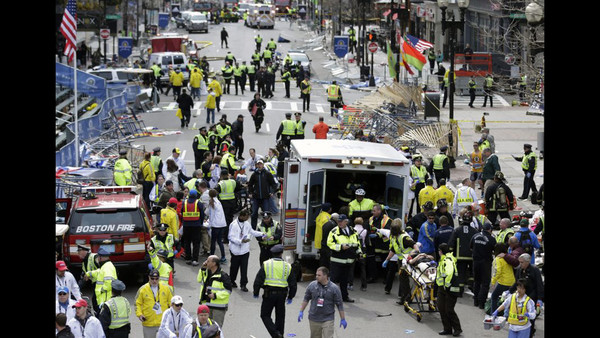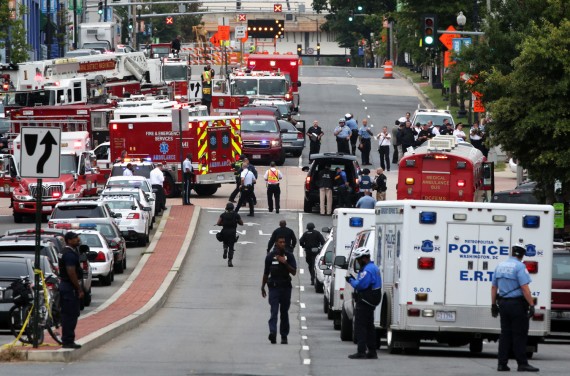National Summits on Preventing Multiple Casualty Violence
 Immediately following the tragic shooting on July 20, 2012 at the Century movie theater in Aurora, Colorado, and in recognition of increased public alarm over multiple casualty violence in the United States, the U.S. Department of Homeland Security’s (DHS) Federal Law Enforcement Training Center (FLETC) began partnering with the U.S. Department of Justice’s (DOJ) Office of Community Oriented Policing Services (COPS Office) and the Johns Hopkins University, School of Education, Division of Public Safety Leadership (JHU-PSL), to bring together a cross-section of stakeholders from a variety of disciplines, including law enforcement, health care, law, social sciences, education, and academia, for the purpose of improving the nation’s ability to prevent such incidents.
Immediately following the tragic shooting on July 20, 2012 at the Century movie theater in Aurora, Colorado, and in recognition of increased public alarm over multiple casualty violence in the United States, the U.S. Department of Homeland Security’s (DHS) Federal Law Enforcement Training Center (FLETC) began partnering with the U.S. Department of Justice’s (DOJ) Office of Community Oriented Policing Services (COPS Office) and the Johns Hopkins University, School of Education, Division of Public Safety Leadership (JHU-PSL), to bring together a cross-section of stakeholders from a variety of disciplines, including law enforcement, health care, law, social sciences, education, and academia, for the purpose of improving the nation’s ability to prevent such incidents.
The three partners worked over the next several months to plan and coordinate the National Summit on Multiple Casualty Shootings, held at FLETC’s headquarters in Glynco, Georgia, December 11–13, 2012. More than two dozen experts from multiple disciplines assembled in an effort to advance the safety and security of the nation’s communities: e.g., educational institutions, workplaces, public venues, places of worship, and recreational areas. The summit goal was to bring together a cadre of leaders and subject-area authorities to develop and propose a national dialogue on multiple casualty violence and to create a path forward.
During the preliminary meeting phase of this first summit, the planners developed a set of definitions to serve as a framework for discussions about preventing multiple casualty violence. The FLETC, COPS Office, and JHU-PSL invited subject-matter experts from a wide range of disciplines to engage a cross-section of professions that are positioned to help facilitate the prevention of multiple casualty violence.
Over the course of the three-day summit, these participants further refined and structured the national dialogue on multiple casualty violence and discussed, debated, and built consensus on potential strategies for preventing such incidents. Through careful examination of voluminous summit notes and documentation, summit partners synthesized definitions into a common framework and developed recommendations for future actions. These delineate the direction of future conversations and meetings on preventing multiple casualty violence.
The second summit, titled “National Summit on Preventing Multiple Casualty Violence: Strategic Approaches to Information Sharing,” was intended to expand the national dialogue on preventing the types of heartbreaking incidents that have unfolded in places like Virginia Tech; Newtown, Connecticut; and Aurora, Colorado.
This summit took place at FLETC’s headquarters in Glynco, Georgia, April 9–11, 2013.
In an effort to improve the safety and security of the nation’s communities, the second summit brought together a cross-section of stakeholders from a variety of disciplines, including law enforcement, academia, law, medicine, education, social sciences, private security, emergency management, law enforcement training, and psychology. The 31 attendees participated in breakout discussions and a tabletop exercise, listened to presentations on lessons learned from past incidents and successful prevention models, and engaged in conversation with a panel of leaders from a local community. They expanded the discourse on the recommendations that emerged during the first summit and further developed strategies in key areas, including developing a public awareness campaign, identifying and implementing community-based prevention models, and beginning to identify training needs for members of the public safety community.
The most salient theme that emerged during the second summit was the necessary involvement of local communities in prevention strategies; therefore, community oriented policing provides a framework for analyzing summit outcomes. Specifically, when a police department implements community oriented policing successfully, the organizational changes and resultant approaches that make it effective can shape strategies designed to prevent multiple casualty violence.
The second summit revealed the need for additional efforts in identifying successful community intervention models and, more broadly, incorporating the philosophy of community oriented policing into discourse on the prevention of multiple casualty violence. Focusing public safety on community-based approaches and broadening the application of policing within the community emerged as opportunities for institutionalizing a public mindset of collective responsibility for preventing these incidents that continue to shock the public consciousness.
 The third summit was held at FLETC’s headquarters in Glynco, Georgia, February 4–7, 2014. The purpose of the third summit was to create a framework for a prevention toolkit to help communities prevent multiple casualty events. This summit brought together experts in health care systems, crisis intervention teams, local and state-level governments, mental health services, law enforcement, and school systems. Additionally, experts from the advertising campaign and media fields attended to provide input and advice on the development and dissemination strategies for the prevention toolkit.
The third summit was held at FLETC’s headquarters in Glynco, Georgia, February 4–7, 2014. The purpose of the third summit was to create a framework for a prevention toolkit to help communities prevent multiple casualty events. This summit brought together experts in health care systems, crisis intervention teams, local and state-level governments, mental health services, law enforcement, and school systems. Additionally, experts from the advertising campaign and media fields attended to provide input and advice on the development and dissemination strategies for the prevention toolkit.
The summit participants attended sessions on community-based prevention models and community policing strategies, and looked at the elements of other successful toolkits and campaigns. The last day of the summit focused on providing suggestions for the elements of the proposed prevention toolkit.
It is the hope of the summit team that this work will continue on beyond these three summits. It was clear from the summit participants that the best success in the prevention of this kind of violence will happen due to the efforts of local communities. The prevention toolkit, once developed, will provide communities with valuable materials and a place to start working to deliver help to those who may be in the position to intervene in someone’s life before a multiple casualty act of violence happens.
For more information about the summits, please contact Barry Bratburd, Sr. Policy Analyst, COPS Office at barry.bratburd@usdoj.gov.
Barry Bratburd
Senior Policy Analyst
COPS Office
Preventing Multiple Casualty Violence | CrimeStat IV | Modern-Day Slavery and CP | Colorado Springs CSO Program | Law Enforcement and Communities of Color | Hero911 App | 2014 Sutin Award | National Center for Building Community Trust and Justice | 2014 CPD Coming Soon!
